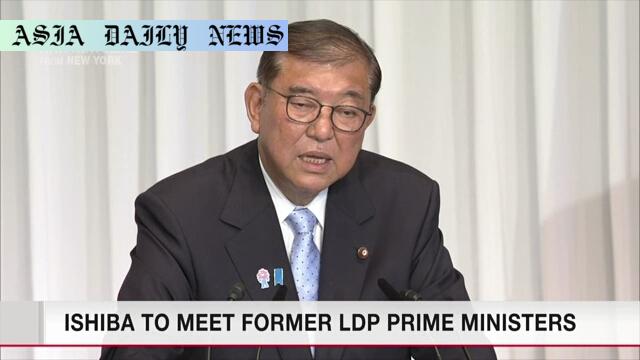Ishiba to meet with key LDP former prime ministers amidst resignation calls.
Ishiba to consult with key LDP former prime ministers to restore stability.
Young lawmakers demand Ishiba resign after a major electoral defeat.
Ishiba seeks to analyze the loss and prevent political stagnation.

Ishiba Meets Former LDP Prime Ministers Amidst Turmoil
Japan’s Prime Minister Ishiba Shigeru is gearing up for a critical meeting with three significant figures from his Liberal Democratic Party (LDP) as he navigates mounting pressure to resign from his position. This urgent dialogue will involve Aso Taro, Vice-President Suga Yoshihide, and Kishida Fumio, three prominent LDP leaders who have shaped the political landscape in Japan. The meeting is pivotal, coming just days after the LDP and its coalition ally Komeito suffered a crucial setback in the Upper House elections, losing their majority—a loss that has generated waves of discontent within the party.
Younger and mid-ranking lawmakers within the LDP are calling for Ishiba’s resignation, questioning his leadership in light of the election outcome. Despite the growing chorus for change, Ishiba has firmly stated his intention to stay in office, arguing that stepping down would lead to a political stalemate during a crucial time for the government. As frustration brews among regional LDP branches, with calls for a reshuffle of party executives, Ishiba’s meeting with these former prime ministers will likely serve as an opportunity to reflect on the party’s challenges and outline a plan to regain trust.
Analyzing The Election Loss: A Leadership Under Fire
With the defeat fresh in the public’s mind, Ishiba wants to focus on analyzing the reasons behind the outcome. This analysis will be critical to understanding the electorate’s dissatisfaction and preventing future losses. Ishiba is expected to share his initial insights with the former prime ministers and request their cooperation in managing government affairs effectively. While his decision to stay firm in office has surprised many within the party, Ishiba’s leadership now hinges on addressing these pivotal concerns to prevent further decline in public trust or internal unrest within the LDP.
However, not everyone within the party shares Ishiba’s optimism. Sasagawa Hiroyoshi, the State Minister of Agriculture, Forestry, and Fisheries, expressed his doubts, arguing that it is natural for a leader to take responsibility in such circumstances. The alternative perspective comes from the pragmatic camp, represented by Foreign Minister Iwaya Takeshi, who believes that political stability should be the priority to ensure the country moves forward, particularly through challenging economic and social times.
Regional Discontent and Party Responsibility
Further compounding Ishiba’s challenges are grassroots frustrations, with several local LDP branches in areas like Ibaraki and Tochigi drafting documents demanding his resignation. This regional dissent signals deeper discontent with the central party’s performance. Ishiba, however, seems committed to steering clear of resigning, intent on avoiding further instability, which could jeopardize the party’s organizational cohesion and its electoral standing in the upcoming political cycles.
The political stability of Japan and the effective functioning of its government are at stake as Ishiba fights to maintain control of his party and regain public trust. While the LDP’s image suffers, the larger goal remains avoiding stagnation that could harm not only the party but policies that are crucial for Japan’s global standing, economic reforms, and regional commitments.
Commentary
A Leadership Balancing Act
Ishiba Shigeru’s current predicament raises important questions about leadership accountability and the role of internal party dynamics in shaping a government’s direction. His insistence on staying in office after the LDP’s bruising loss in the Upper House elections showcases his determination but also underscores a risky political gamble. Leaders, especially in democracies, must learn to strike a balance between preserving stability and owning up to significant missteps. In this case, Ishiba must thread this needle skillfully to regain respect and trust within LDP ranks and among the electorate.
The Value of Experience
The decision to meet three seasoned LDP leaders—Aso Taro, Suga Yoshihide, and Kishida Fumio—is a sound strategic move by Ishiba. Their vast experience can provide him with a critical roadmap, not only for handling intra-party resistance but also for addressing the fallout of electoral defeat. Leaders must recognize the value of collaborative input, and this meeting, if carried out earnestly, could bolster Ishiba’s case for staying in power by demonstrating that he seeks to unify the party rather than divide it further. Moreover, counsel from these political stalwarts could grant Ishiba the perspective required to fine-tune his approach in the coming days.
Navigating a Tenuous Path Forward
The weight of leadership calls for both courage and wisdom, and for Ishiba, these qualities will be needed in spades. He faces an uphill battle, with discontent simmering among various factions and younger lawmakers actively campaigning for his ouster. However, resigning amidst turmoil does not necessarily offer a lasting solution. What is required now is a coherent vision to address the LDP’s electoral weaknesses and restore public confidence. Success in this endeavor could transform Ishiba from a pressured figure to a resilient leader who succeeded against the odds.
The situation is a reminder of how delicate and pivotal moments in leadership can redefine a political figure’s legacy. Whether Ishiba emerges as a stabilizer or is ultimately overtaken by the forces of change within his party is yet to be seen. His next moves will undoubtedly shape not only the future of his leadership but also the trajectory of the LDP and its governance.


